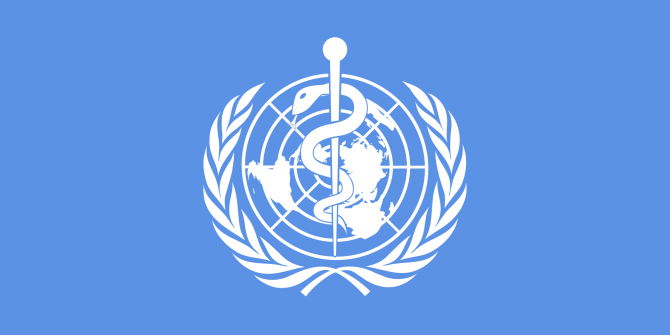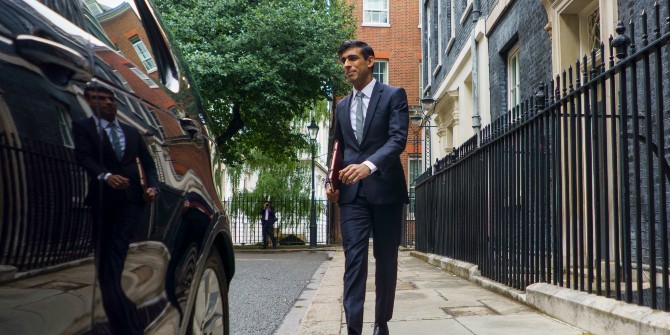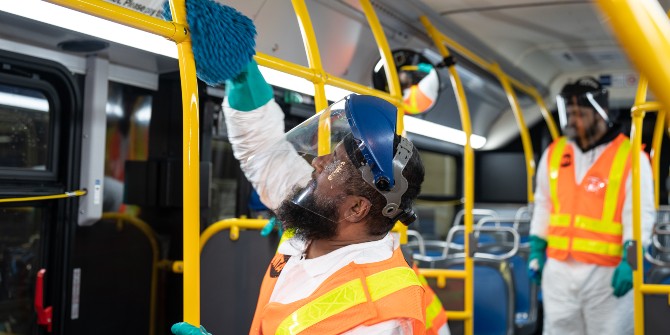The COVID-19 crisis has exposed what some scholars of international organizations have been noticing in recent years: a retrenchment from international cooperation and multilateral approaches to problem-solving. While the Trump administration’s admonishment of the World Health Organization is a political manoeuvre to brandish a scapegoat for the administration’s abysmal failures, it also a telltale sign of broader efforts to withdraw from and undermine international cooperation. However, could COVID-19 herald the renewal of international cooperation, asks Theresa Squatrito (LSE)?
International cooperation has been under pressure in the lead up to the current pandemic. Notably, the Trump administration’s budget for the 2021 fiscal year – released in early February 2020 and drafted in the months prior to the growing pandemic – proposed a significant reduction to the U.S.’ financial contributions to the WHO. In recent years, the US government has adopted several decisions which similarly signal a withdrawal from international cooperation, including stepping down from the Human Rights Council, pulling funds from UNESCO, paralyzing the Appellate Body of the World Trade Organization, exiting from the Paris Agreement and the Iran Nuclear agreement, among others.
The US, however, is not the only state that has pushed back against international cooperation. For example, some states have threatened to, and proceeded to, withdraw from the International Criminal Court (Burundi and the Philippines). Some states have simply defied their international obligations. For example, the Russian government has been sanctioned by several international organizations, include the Council of Europe, for its failures to adhere to international law in regards to Crimea. The Brazilian government under President Bolsonaro has uncut global efforts to combat climate change and deforestation. Moreover, Brexit is among the most profound perils to befall international cooperation. These developments have led scholars in recent years to speak of contested multilateralism, backlashes against international institutions and legitimacy crises in global governance.

Will COVID-19 prompt a renewed commitment to multilateralism? What will a renewal of international cooperation require in the coming months?
It is possible that the COVID-19 crisis is a critical juncture for global governance, where significant change may arise from the pandemic by creating a political opportunity for agency. However, for this moment to manifest in a renewal of international cooperation leaders must recognize it as a political opportunity. If we harken back to historically prominent examples of commitments to international cooperation, key leaders acted and lead at pivotal moments to drive multilateralism. Whether it be Woodrow Wilson and the League of Nations, President Franklin Roosevelt and Winston Churchill after WWII, Robert Schuman and Jean Monnet’s role in the establishment of what is today known as the EU, leaders recognized the political opportunity provided by broad events and acted as entrepreneurs of multilateral problem-solving. As of today, it is hard to identify any world leaders who might pursue bold efforts to renew international cooperation. It, however, may be a bit early to see the marks of such leaders today, as most heads of government are focused primarily on managing the crisis domestically.
Leadership however is most likely not enough. Policymakers and societal elites must be clear about how international cooperation can contribute to problem-solving and maintain discursive practices that legitimize cooperation. The fading commitment to multilateralism in recent years has been driven by strong discursive practices of de-legitimation. Across the board, policy decisions that threaten international cooperation have relied on rhetoric that weakens societal beliefs in the appropriateness of cooperation. For example, elites of various kinds have drummed on about the costs of cooperation. Among the costs frequently highlighted are those to national sovereignty. The Brexit campaign took the abstract concept of sovereignty and put it into the fore of ordinary citizens’ understanding of how the EU posed a threat to their daily lives. Economic costs are also frequently weaponized by the opponents of multilateralism: international cooperation is put forward as the cause of, for example, domestic job losses and sources of waste on national budgets. De-legitimation strategies have also included efforts to challenge beliefs that a problem exists. For example, climate scepticism has been central to the de-legitimation of cooperation on climate change. Other efforts to de-legitimize international cooperation rally around claims of injustice, unfairness or existential threats to cultural preservation. Whichever it is, there are typically very clear messages of harm arising from multilateralism.
Thus, a renewal of multilateralism will most likely require legitimation strategies to counteract these messages of harm. In recent years, legitimation has often been left to international organizations themselves, while state leaders and societal elites have infrequently heralded the benefits of international cooperation. Yet, the benefits of cooperation are significant and critical. The COVID-19 crisis points to a variety of ways that international cooperation can indeed be crucial to global problem-solving. For example, the WHO plays a vital role in information sharing that has so far been crucial to managing the crisis. The dissemination information on the nature of the disease, treatment protocols, testing methods and research on possible vaccines has all been aided by the WHO. Cooperation will most likely be critical to ensuring not only a coordinated response to the disease, but also the problems that have ensued from the pandemic, whether it be the impending global economic recession or the backsliding of good governance and human rights. Policymakers would be remiss to assume that the public understands the benefits of multilateralism. If international cooperation is to be renewed in these difficult times, discursive practices that legitimize global governance will likely need to be put forward by policymakers.
This post represents the views of the author and not those of the COVID-19 blog or LSE.





